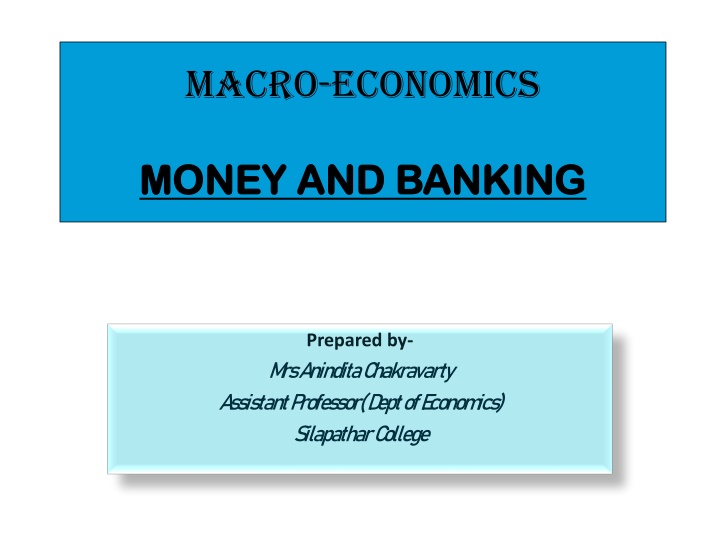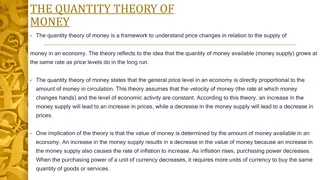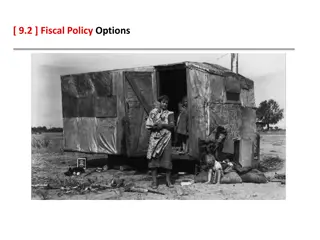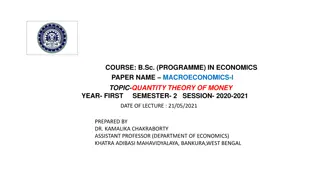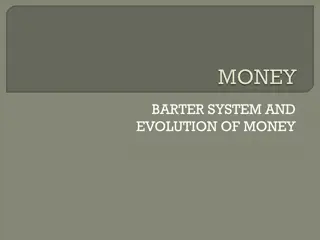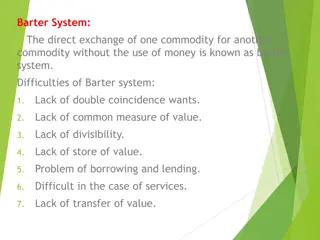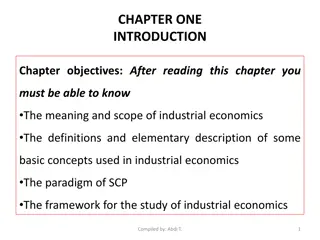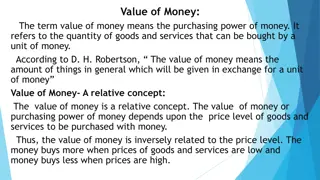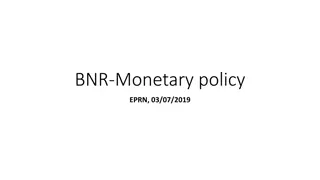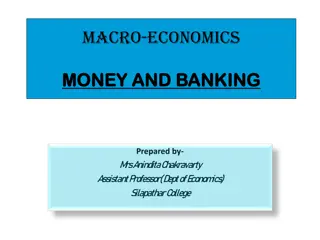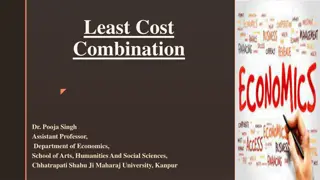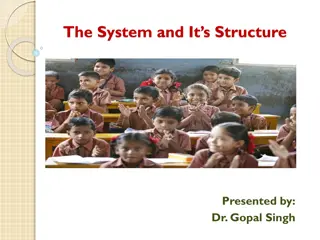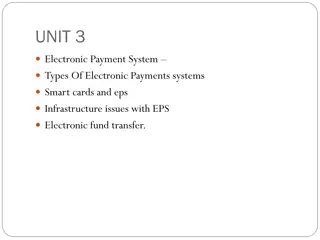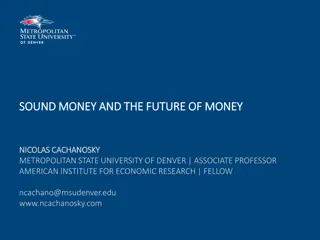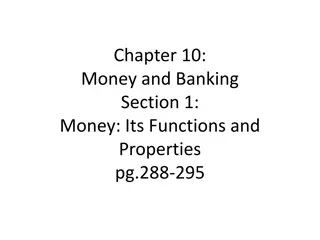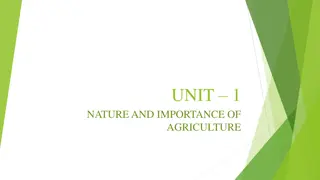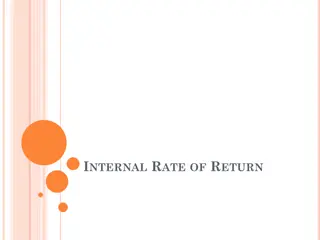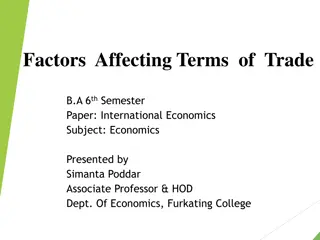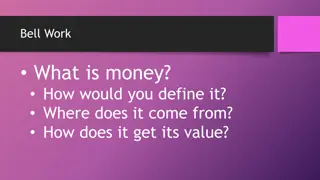Evolution of Money and Drawbacks of Barter System in Economics
Money's role in facilitating economic exchanges and overcoming the limitations of the barter system are key topics covered in this presentation. Discusses the significance of money, the challenges of barter such as lack of double coincidence of wants, absence of common measure of value, and issues with future payments. Offers insights into the evolution of money from barter to modern currency systems.
Download Presentation

Please find below an Image/Link to download the presentation.
The content on the website is provided AS IS for your information and personal use only. It may not be sold, licensed, or shared on other websites without obtaining consent from the author.If you encounter any issues during the download, it is possible that the publisher has removed the file from their server.
You are allowed to download the files provided on this website for personal or commercial use, subject to the condition that they are used lawfully. All files are the property of their respective owners.
The content on the website is provided AS IS for your information and personal use only. It may not be sold, licensed, or shared on other websites without obtaining consent from the author.
E N D
Presentation Transcript
MACRO-ECONOMICS MONEY AND BANKING MONEY AND BANKING Prepared by- M rs A nindita C hakravarty A ssistant P rofessor( D ept of E conom ics) Silapathar C ollege
Dear students, in this PPT we will focus on the meaning of money and its evolution Money plays an important role in any kind of economic system. The main function of money is to facilitate the exchange of goods and services. But, prior to the introduction of money, trade was carried out by barter. Under the barter system, goods were exchanged for other goods. For eg: a piece of cloth was exchanged for a given quantity of potatoes. The Barter System refers to the system of exchange where goods and services were exchanged directly for other goods and services. Thus, money had no role to play in this system.
However students, even though some of the traditional and tribal communities practice barter even today, but there are certain drawbacks of the system that needs to be highlighted. LackofDoubleCoincidenceofW ants LackofCom m onM easur eofValue Pr oblemofFutur ePaym ents Pr oblemofStor eofValue Let us discuss one by one
Lack Of Double Coincidence of Wants It is necessary for a person who wishes to trade his good or service to find some other person who is not only willing to buy his good or service but also possesses that good which the former wants. This is double coincidence of wants. For eg: suppose a person has rice and wants to exchange it for utensils. He has to find out a person who not only have utensils but also wants rice in return. But, such a double coincidence is a rare possibility. The barter system requires a double coincidence of wants on the part of those who want to exchange goods or services.
Lack of Common Measure of Value The value of each good and service would have to be expressed not just in one quantity but in as many quantities as there are kinds and qualities of other goods and services in the market. The value of a good or service means the amount of other goods and services it can be exchanged for in the market . Proper accounting system was absent in barter system. There is no common unit in terms of which values of goods and services can be measured and stated.
Problem of future payments Because future payments might be problematic as: 1. There might be disagreement regarding the quality of goods In an exchange economy, people enter into agreements relating to wages, salaries, interests, rents and other prices extending over a period of time. But, barter system does not involve future payments. 2. There might be disagreement regarding which good to be used for repayment. 3. There exists a risk associated with the value of the good over a period of time.
Problem of Store of Value But goods like milk, vegetables, fruits are perishable in nature and not durable. Storage in the form of goods may be costly. In this system, people can store value of purchasing power only in the form of specific goods.
Due to such drawbacks of the barter system the process of exchange becomes highly inefficient. To overcome such difficulties, money was invented . Economists hold different opinions regarding the definition of money such as Legal definition Functional definition Narrow and Broad definition
Anything which the government declares as money is money. A thing will have general acceptability if the law declares it as money. Currency notes and coins are legal tender money. It is also called fiat money, as it serves as money on the order of the government. Legal Definition Money is defined on the basis of the functions it performs Money is anything which is generally accepted as a medium of exchange in payment of debts and as payment of goods and services. Functional Definition Narrow definition of money is based upon its medium of exchange function which includes currency notes and coins. Broad definition of money includes some other things in the supply of money that have a high degree of moneyness and has store of value. Eg: Saving deposits Narrow and Broad Definition
Dear students, this was all about the topic of today s discussion.. I hope you can understand whatever I tried to express in the slides.. For your better understanding please go through your text-books and reference books. Now I would like to provide some assignments to you related to the topic..I m quiet sure that you all would complete the assignment. Thank You..
Assignmet ( m denotes marks carried by the questions) 1. Define Barter System? 1m 2. Mention the drawbacks of Barter System. 2m 3. What do you mean by double co-incidence of wants? 2m 4. Explain how barter system lacks a common measure of value? 2m 5. Explain: 2+2=4m a) Problem of store of value in barter system b) Problem of future payments in barter system 6. State the legal definition of money. 1m 7. State the functional definition of money. 1m 8. Write one difference between narrow and broad definition of money. 1m
